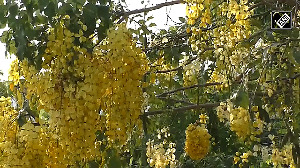Prime Minister Manmohan Singh on Friday sought support from the 25-nation European Union for India's quest for nuclear energy for peaceful purposes and asserted that New Delhi did not want "further erosion" of the non-proliferation regime.
Addressing the India-EU Summit in Helsinki, he said the 45-member Nuclear Suppliers Group had on Thursday given India an opportunity to reiterate its firm commitment to non-proliferation objectives while working with like-minded countries in expanding cooperation in peaceful uses of nuclear energy.
"We hope that the European Union will be in a position to support forward-looking approaches to enhance international cooperation in the peaceful uses of nuclear energy. This will enable countries like India to expand the share of nuclear energy in their national energy baskets," Dr Singh said.
The statement assumes significance as EU president Finland had said on Thursday the multi-nation bloc is yet to reach a common position on the issue of India getting access to civil nuclear technology and fuel.
Finnish Prime Minister Matti Vanhanen, however, said efforts were underway to evolve a common view.
Dr Singh thanked the EU for its support for India joining the multi-nation International Thermonuclear Experimental Reactor project as a full partner earlier this year.
The project is aimed at tapping fusion to produce energy.
India was accepted as a full partner in the ITER project in December 2005.
The other partners in the project are the US, the EU, China, Japan, South Korea and Russia.
The financial cost of India's participation in ITER will be around Rs 200 crore annually.
The multi-million dollar ITER project has been undertaken to demonstrate the scientific and technological feasibility of applying fusion for peaceful purposes like producing electricity.
Dr Singh said achieving energy security to provide safe, secure, affordable and sustainable energy was "our common concern" and "we must also look to alternatives to our dependence on fossil fuels through non-polluting sources such as nuclear energy".
On the ambitious Galileo Global Satellite Project, he hoped that the EU would be in a position to conclude an early agreement confirming India's membership.
India had expressed interest in participating in the ITER project as a full partner as it has an advanced scientific and technological base.
It has enormous energy needs and will be immensely benefited with this partnership, as it desires to tap all possible sources of energy.
India has been running an experimental fusion programme since the mid-1980s with the indigenously built operational tokamak reactor Aditya. It also has an advanced steady state super-conducting tokamak (SST-1) in the final stage of construction.
An Indian team is on the threshold of generating a fusion reaction lasting around 1,000 seconds.
India, backed up by its vast experience, believes it will make effective contributions to the ITER project.
Its acceptance as a full partner is an acknowledgment of it being a responsible nuclear state with advance atomic technology including in the field of fusion research.
It also recognises that India can significantly contribute to such endeavours.
As a full partner, Indian contribution to the ITER shall on the same basis as that of other partners.






 © 2025
© 2025